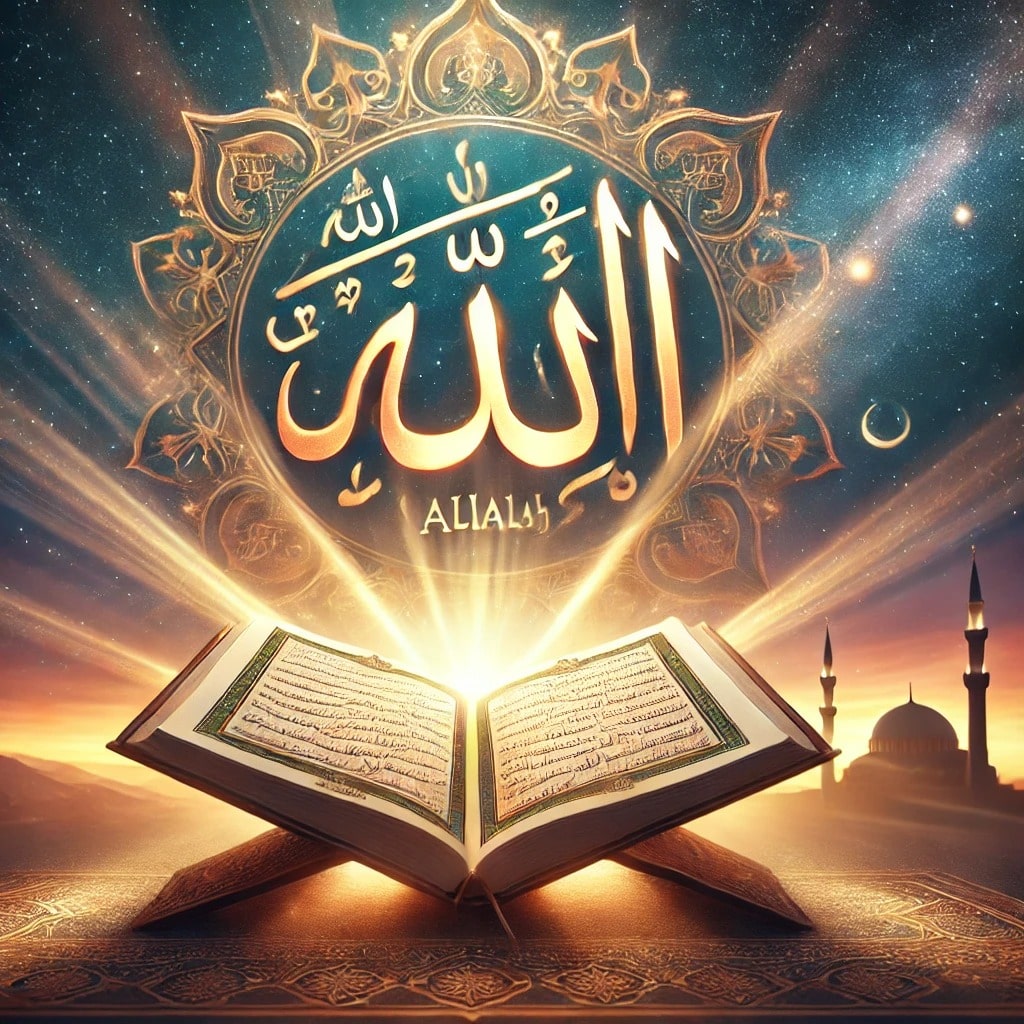بِسْمِ ٱللَّهِ ٱلرَّحْمَـٰنِ ٱلرَّحِيمِ
Allah’s Name to commence with, the Most Gracious, the Most Merciful
This article below explains key Islamic beliefs about Allah’s attributes, eternal knowledge, divine speech, predestination (Qada wa Qadr), human accountability, and free will and destiny.
Islamic Beliefs Regarding Allah’s Attributes & Power
Belief: Allah’s speech is free from sound, and the Qur’an we recite with our tongue and write in the form of the book is His (Allah Almighty’s) “ETERNAL” soundless speech. Our acts of reciting, writing, and making sounds are perishable creations. While the words we recite are ETERNAL. Similarly, our writing is created, but the text itself is ETERNAL. Our hearing is created but what we heard is ETERNAL. Our memorization is created but, what we memorized is ETERNAL.
In other words, Allah’s speech (present in the form of the Holy Quran, and previously revealed as the Gospel (Injeel), the Torah (Taurat), the Psalms (Zaboor), etc.) is ETERNAL, while our acts of reciting, writing, hearing, and memorizing it are all created.
Belief Regarding Allah’s Knowledge
Belief: His (Allah’s) knowledge encompasses everything- particulars, universals, all existences, non-existences, impossibilities and possibilities. He knew all of these from eternity, knows now, and will know them forever. Things may change, but His knowledge does not change. He is fully aware of the thoughts and whispers within hearts and there is no limit to His (Allah Almighty’s) knowledge.
As the Holy Quran says: يَعْلَمُ مَا فِى ٱلسَّمَـٰوَٰتِ وَٱلْأَرْضِ وَيَعْلَمُ مَا تُسِرُّونَ وَمَا تُعْلِنُونَ ۚ وَٱللَّهُ عَلِيمٌۢ بِذَاتِ ٱلصُّدُورِ (He knows whatever is in the heavens and in the eath, and He knows what you hide, and what you disclose; and Allah knows what is within the hearts). (Parah: 28, Surah:64, Verse No: 4)
Belief: He knows both the unseen and the seen; INTRINSIC knowledge is His exclusive attribute. Anyone who ascribes INTRINSIC knowledge of Allah either the seen or the unseen to anyone other than Allah Almighty is a DISBELIEVER (KAFIR).
As Allah Almighty says in the Holy Quran: هُوَ ٱللَّهُ ٱلَّذِى لَآ إِلَـٰهَ إِلَّا هُوَ ۖ عَـٰلِمُ ٱلْغَيْبِ وَٱلشَّهَـٰدَةِ ۖ (He is Allah—there is no god ˹worthy of worship˺ except Him: the Knower of the unseen and seen). (Parah: 28, Surah: 59, Verse No:22)
The meaning of INTRINSIC knowledge is “the knowledge acquired independently, without being granted by Allah Almighty”.
Belief: He is the creator of everything, whether it be beings or actions, all are created by Him. As stated in the Holy Quran: ٱللَّهُ خَـٰلِقُ كُلِّ شَىْءٍۢ (Allah is the creator of everything) (Parah: 13, Surah: 13, Verse No:16)
Belief: In reality, Allah Almighty is the provider of sustenance, the angels, etc., are merely means and intermediaries. As Allah Almighty says in the Holy Quran: إِنَّ ٱللَّهَ هُوَ ٱلرَّزَّاقُ ذُو ٱلْقُوَّةِ ٱلْمَتِينُ ٥٨ (Indeed, only Allah is the great provider, the mighty, the powerful). (Parah: 27, Surah: 51, Verse No:58)
Islamic Beliefs Regarding Destiny in Islam
Belief: Every good and evil has been predestined by Allah Almighty according to His eternal knowledge. He knew from eternity, what would happen and who would act in a certain way, and He (Allah Almighty) wrote it accordingly. This does not mean that we are forced to act as it was written; rather, He (Allah Almighty) wrote, what we were going to do according to our own will.
For example: If wrongdoing was written for John, it is because John was going to commit it; if John had been inclined towards goodness, goodness would have been written for him. Thus, Allah Almighty’s knowledge or writing does not compel anyone.

The Holy Prophet Muhammad (Peace and Blessings of Allah Be Upon Him) described those who deny “destiny” as the “Magians” of this Ummah.
Belief: Destiny is of three types:
Absolute (Mubram Haqeeqi)
That which is not dependent on anything, as per the knowledge of Allah Almighty.
Conditional (Muallaq Mahaz)
That which is shown as conditioned upon something to the Angels.
Apparent Absolute (Muallaq Shabeeh Bil Mubram)
That does not reflect any conditions in the records of the Angels, even though it has conditions in divine knowledge.
Absolute Destiny (Mubram Haqeeqi)
The Absolute Destiny (Mubram Haqeeqi) is unchangeable. If the beloved servants of Allah Almighty inadvertently make any request regarding it, they are informed and directed to withdraw their requests accordingly.
Here is a concrete example of Absolute Destiny (Mubram Haqeeqi):
The Angels brought punishment upon the people of Lot (Qaum e Loot), our noble Prophet Ibrahim (Abraham) pure mercy, became so concerned about these Disbelievers (Kafirs) that he began fighting with his Lord (Allah Almighty) on their behalf. As Allah Almighty says in the Holy Quran: يُجَـٰدِلُنَا فِى قَوْمِ لُوطٍ ٧٤ (He began to fight with Us (Allah Almighty), regarding the people of Lot) (Parah: 12, Surah: 11, Verse No:74)
This punishment upon the people of Lot (Qaum e Loot) was Absolute Destiny (Mubram Haqeeqi). So, it wasn’t changed despite the request of the Prophet Ibrahim (Abraham) (Peace be Upon Him). As Allah Almighty says in the Holy Quran: يَـٰٓإِبْرَٰهِيمُ أَعْرِضْ عَنْ هَـٰذَآ ۖ إِنَّهُۥ قَدْ جَآءَ أَمْرُ رَبِّكَ ۖ وَإِنَّهُمْ ءَاتِيهِمْ عَذَابٌ غَيْرُ مَرْدُودٍۢ (O Ibrahim! Refrain from this thought. Indeed, your Lord’s command has arrived, and punishment is indeed destined upon them; that which will not be averted). (Parah:12, Surah: 11, Verse No: 76)
Conditional (Muallaq Mahaz)
The apparent conditional decree (Qaza-e-Muallaq) is often accessible to most saints (Awliya), and through their prayers and efforts, it can be changed.
Apparent Absolute (Muallaq Shabeeh Bil Mubram)
The intermediate state, which can be considered absolute (Mubram) from the perspective of the angelic records, is accessible only to distinguished and eminent Saints (Khawas Akabir).
Issue 1: The matters of Qada wa Qadr (Divine Decree and Predestination) are beyond the grasp of ordinary human intellect. Delving deeply into these issues can lead to destruction. Even great companions like Sayyiduna Abu Bakr Siddiq and Sayyiduna Umar Farooq (may Allah be pleased with them) were prohibited from engaging in debates on this topic. If they were warned, where do we stand in comparison?
Understand this: Allah Almighty did not create humans like stones or other inanimate objects, devoid of sense or motion. Instead, He granted them a limited form of choice, enabling them to decide whether to do something or not. Along with this choice, He gave them the intellect to discern between good and evil, benefit and harm. He also provided them with the means and resources to act, such that whenever a person tries to do something, the necessary things become available.
On this basis, humans are held accountable. To regard oneself as completely compelled or completely independent are both forms of misguidance.
Issue 2: Blaming fate or Allah’s will for bad deeds is wrong. The correct way is to attribute good deeds to Allah and consider bad deeds as the result of one’s own actions and desires.
As stated in the Holy Quran: مَّآ أَصَابَكَ مِنْ حَسَنَةٍۢ فَمِنَ ٱللَّهِ ۖ وَمَآ أَصَابَكَ مِن سَيِّئَةٍۢ فَمِن نَّفْسِكَ ۚ (O listner! Whatever good reaches you, that is from Allah; and whatever evil reaches you, that is from yourselves). (Parah: 5, Surah:4, Verse No:79)
Belief: Allah Almighty is free from direction, place, time, motion, rest, shape, form, and all created beings or occurrences.
I’ve shared some key foundational beliefs in Islam, with more insights coming soon. Stay connected to deepen your understanding and strengthen your faith. Missed Foundational Islamic Beliefs: Part 1? Click here!
If you have any queries feel free to contact us. Connect through social media handles:




Pingback: Foundational Islamic Beliefs: Part 3 - ISLAMICAGE